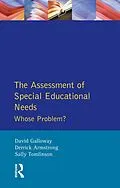The debate about special needs provision has increased dramatically over the last 15 years, however, despite the widespread concern over both learning and behavioural difficulties, there have been few attempts to analyse in detail the process of assessment by which children are being identified as having special educational needs. Drawing upon research carried out by the authors, this book fills that gap by examining the process in detail. It considers the assessment process itself and how it affects and is affected by other areas of school policy - in some cases causing tension and conflict such as parental participation, the use and allocation of resources and multi-professional decision-making. A feature of the book is its analysis of the impact of the National Curriculum and the local management of schools (LMS) provision for special needs.
Autorentext
David M Galloway, Derrick Armstrong, Sally Tomlinson
Inhalt
Prefaces
Notes on Authorship
Abbreviations
Acknowledgements
List of figures and tables
Disclaimers
Part 1: The context of assessment
1. The origins and meaning of special educational needs
2. The 1988 Education Reform Act: liberator or albatross?
3. The allocation and negotiation of resources
Part 2: Children's parents' and professional perspectives
4. Children's perspectives on assessment
5. Parents' participation
6. Educational psychologists: educationalists, clinicians or resource gatekeepers?
Part 3: Looking beyond the data
7. Categories and social identities
8. Professional cultures and their consequences
9. Multidisciplinary assessment: Is it justified?
10. Conclusions
